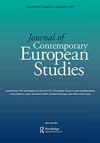Building legitimacy: why the populist radical right engages in grassroots activism at the local level
IF 1.8
3区 社会学
Q1 AREA STUDIES
引用次数: 0
Abstract
ABSTRACTWhile the literature has widely explored the organisational strategies of populist radical right parties (PRRPs) on the fringes, little is known about the grassroots activism of mainstream PRRPs. We focus on the Italian League and the Swiss People’s Party (SVP), two mainstream PRRPs that have a long pedigree of government experience, to investigate if, how and why they invest in extensive activities at the local level to reach the public, despite their pivotal position in the national political scene. Methodologically, we rely on 120 interviews with members and representatives of these two PRRPs to identify the key grassroots activities they carry out at the local level and their perceived goals. The analysis reveals that despite their mainstream status, both the League and SVP still perceive to suffer from stigmatisation and demonisation, as they are not fully accepted as legitimate actors by the public. For this reason, they engage in grassroots activities and activism at the local level, the one closest to the everyday life and concerns of ordinary citizens. Grassroots activism aims to improve the legitimacy of PRRPs, by delivering the idea that their members and activists are normal people committed to help the local communities and not extremists.KEYWORDS: Populist radical rightgrassroots activismparty organisationstigmatisationlocal politics Disclosure statementNo potential conflict of interest was reported by the author(s).Supplementary materialSupplemental data for this article can be accessed online at https://doi.org/10.1080/14782804.2023.2269383Notes1. In the following pages, interviews are cited using abbreviations: the letter R stands for ‘representative’, while the letter M refers to ‘members’.Additional informationFundingThis research is supported by the Economic and Social Research Council (ESRC), (Grant Ref: ES/R011540/1), The survival of the mass party: Evaluating activism and participation among populist radical right parties (PRRPs) in Europe.建立合法性:为什么民粹主义激进右翼在地方层面参与基层行动主义
摘要虽然文献对边缘民粹主义极右翼政党的组织策略进行了广泛的探讨,但对主流民粹主义极右翼政党的基层行动主义却知之甚少。我们将重点放在意大利联盟和瑞士人民党(SVP)这两个拥有悠久政府经验的主流prrp上,调查他们是否、如何以及为什么投资于地方层面的广泛活动,以接触公众,尽管他们在国家政治舞台上占据关键地位。在方法上,我们依靠与这两个prrp的成员和代表的120次访谈来确定他们在地方一级开展的主要基层活动及其预期目标。分析显示,尽管他们的主流地位,联盟和SVP仍然认为遭受耻辱和妖魔化,因为他们没有被公众完全接受为合法的行动者。因此,他们在最贴近普通公民日常生活和关切的地方层面开展基层活动和行动。草根行动主义旨在提高prrp的合法性,通过传递这样一种理念,即prrp的成员和活动家都是致力于帮助当地社区的普通人,而不是极端分子。关键词:民粹主义激进右翼草根活动政党组织污名化地方政治披露声明作者未报告潜在的利益冲突。补充材料本文的补充数据可在https://doi.org/10.1080/14782804.2023.2269383Notes1上在线获取。在接下来的几页中,采访都使用了缩写:字母R代表“代表”,而字母M代表“成员”。本研究得到了经济与社会研究委员会(ESRC)的资助,(资助号:ES/R011540/1),大众政党的生存:评估欧洲民粹主义激进右翼政党(prrp)的行动主义和参与。
本文章由计算机程序翻译,如有差异,请以英文原文为准。
求助全文
约1分钟内获得全文
求助全文
来源期刊

Journal of Contemporary European Studies
Multiple-
CiteScore
2.70
自引率
7.70%
发文量
84
期刊介绍:
The Journal of Contemporary European Studies (previously Journal of European Area Studies) seeks to provide a forum for interdisciplinary debate about the theory and practice of area studies as well as for empirical studies of European societies, politics and cultures. The central area focus of the journal is European in its broadest geographical definition. However, the examination of European "areas" and themes are enhanced as a matter of editorial policy by non-European perspectives. The Journal intends to attract the interest of both cross-national and single-country specialists in European studies and to counteract the worst features of Eurocentrism with coverage of non-European views on European themes.
 求助内容:
求助内容: 应助结果提醒方式:
应助结果提醒方式:


